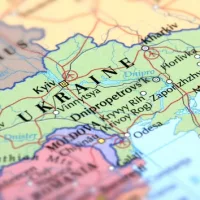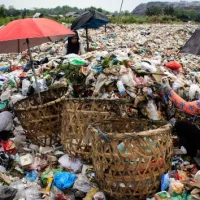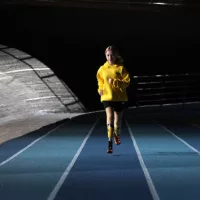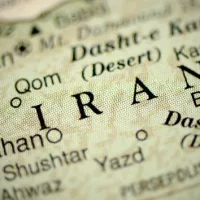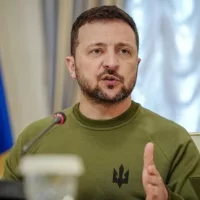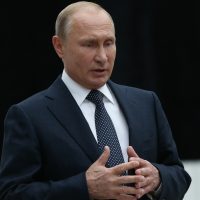
 Mikhail Svetlov/Getty Images(MOSCOW) — President Vladimir Putin Thursday held his annual “Direct Line” telethon show in which he takes dozens of questions from ordinary Russians for hours during a live broadcast on state television.
Mikhail Svetlov/Getty Images(MOSCOW) — President Vladimir Putin Thursday held his annual “Direct Line” telethon show in which he takes dozens of questions from ordinary Russians for hours during a live broadcast on state television.
An odd blend of news interview and talk-radio show, the event enables the Kremlin to touch on questions of national importance, from the economy to relations with the United States.
But much of it is also focused on solving the problems of individual Russians who appeal to Putin on issues ranging from refurbishing a local clinic to fixing someone’s home heating. Any personal problem raised on the show is usually quickly solved as local officials scramble to please Putin.
This is the 16th year Putin has held the show and, as usual, he sat before a bank of telephone operators, fielding 73 questions during almost four and half hours. State television said it had received more than 2.3 million questions for Putin by phone, text message and social media, meaning that getting a problem in front of him was akin to winning the lottery.
A new feature of the show this year saw dozens of governors, mayors, ministers and other officials appear on a video-chat wall — like a strange version of the old U.S. game-show “Hollywood Squares” — waiting in case Putin called on them.
In one case, a truck driver called Putin to complain about high gas prices. After talking, Putin directly transferred to a video link with Russia’s energy minister to bring up the issue.
The questions put to Putin are carefully curated and the show’s presenters never contradict him. The purpose is to show Putin as involved in, and capable of solving, even the smallest of ordinary Russians problems, playing on an old Russian trope of the benevolent tsar whom peasants would petition for help.
The show is a powerful example of the elaborate media apparatus the Kremlin has constructed around Putin that has helped raise his public approval levels to vast heights, often above 80 percent, as in a recent poll.
Occasionally, however, small parts of a less satisfied reality creep in. Giant screens behind Putin scrolled messages from social media users, some far from positive.
One read, “Our lives are getting worse and worse. It’s only in the Kremlin that everything is wonderful.”
Such comments were largely passed by without comment.
Below are some of the key themes and questions to which Putin responded:
On the Trump Steel Tariffs
Putin, with obvious satisfaction, spoke of the trade dispute between European countries and the United States over the Trump administration’s decision to impose new steel and aluminum tariffs. Putin said he had been warning for years that unbridled U.S. power on the global scene was harmful but that “no one wanted to listen.”
He compared the tariffs to the Western sanctions imposed on Russia, claiming European countries had now fallen foul of the United States in the same way.
“This is, in essence, sanctions,” Putin said of the U.S. tariffs.
“And for what? Did they annex Crimea, as many of our partners say,” he joked. “No. It’s connected with the pragmatic interests of the U.S., as they are understood by the current leadership.”
On relations with the West
Some observers have suggested the tariff dispute and the U.S. withdrawal from the Iran nuclear deal have opened a way for Russia to normalize relations with a Europe alienated by Trump administration.
Putin denied that. And asked by a viewer to tell a joke, Putin said he’d heard recently that the Trump administration was “pushing Europe into the arms of Russia.”
“Complete nonsense. I can only take it as a joke,” he said, saying it was the same as the U.S. allegations that Russia had influenced the 2016 election.
He then, though, seemed to imply just that, suggesting that European enthusiasm for U.S.-led sanctions against Russia was waning.
“Those who followed the United States, themselves are starting to suffer from the United States,” Putin said. “I don’t say this to rejoice or to be ironic. I say it because sooner or later it will be understood that these means cannot be universal and that they harm everyone. In the final analysis, I believe that one way or another our relations will normalize.”
On World War III
Asked whether there will be a World War III, Putin first laughed and then quoted physicist Albert Einstein to say there will not be.
“I don’t know with what means the third world war will be conducted, but the fourth will be fought with stones and clubs,” Putin said, paraphrasing Einstein, adding that a new global conflict would mean “the end of civilization.”
The threat of mutually assured destruction will prevent any new global conflict, thanks to the nuclear parity between the major global powers, Putin said.
But he accused the United States of trying to undermine that parity by establishing an anti-missile shield in Europe. In response, he said, Russia is developing new nuclear weapons, which he unveiled earlier this year, that will keep that balance.
But he called on the United States to “sit down at the negotiating table” to establish a “modern scheme of international and European security that is appropriate to the present day.”
The Kremlin has recently called for Putin and President Donald Trump to hold a summit on new arms controls.
On the World Cup
The 2018 soccer World Cup begins in Russia next week. Putin has promoted it as a chance for the country to showcase its greatness. Unfortunately, that is not likely to include soccer greatness: Russia’s national soccer team goes into the home World Cup with the lowest ranking of any team in the tournament except Saudi Arabia, having failed to win a single of its previous seven games.
But Putin said Thursday he expected Russia’s players to rise to the occasion: “We will count on that also our soccer team in the upcoming World Cup will suddenly become good. As it’s called, and will show their best qualities.”
Putin last week more realistically picked Argentina, Brazil, Germany and Spain as favorites to win the tournament.
On Instagram and YouTube
Russia in April banned the popular secure messaging app Telegram, prompting concerns in the country that other platforms, including Instagram and YouTube, could follow.
But asked by a blogger whether Russia will seek to block Instagram and YouTube, Putin said, “I understand your concern. We are not going to shut down anything.”
On His Belief in God
Putin was asked when he began to believe in God?
“That’s a very intimate question,” Putin said. “It’s difficult to talk about in public. In my view, every person is born with a belief in God in their soul. Only different people start to understand that at different times.”
After displaying small interest in religion for much of his life, Putin recently has sought to buttress his rule by linking it to the Russian Orthodox Church.
On New Nuclear Weapons
In March, Putin unveiled a new generation of what he called “invincible” nuclear weapons, among them a drone submarine and a nuclear-powered cruise missile. Putin Thursday said he would soon announce even more weapons.
“That is not all that we are planning to develop and deploy,” he said. “As I said in the [March] address, it is still early to talk about that. But I will soon talk about it.”
On Who Will Succeed Him
Under Russia’s constitution, Putin is in his final six-year term as president, meaning, theoretically, he should step aside in 2024. Moscow is, therefore, rife with speculation about how he will handle that transfer and whether he might name a successor.
A presenter asked him Thursday what he was thinking about a successor:
“I am, of course without question, always thinking about that. But there is no successor in the classical sense of the word. It’s the Russian people, the voters of the Russian Federation, who should determine one,” Putin said.
“But I, of course, am thinking how a new young generation of managers will arise, responsible people, who will be in a state to take responsibility for Russia.”
On What Advice He Would Give His Grandson
“Don’t lie,” Putin said.
Copyright © 2018, ABC Radio. All rights reserved.






